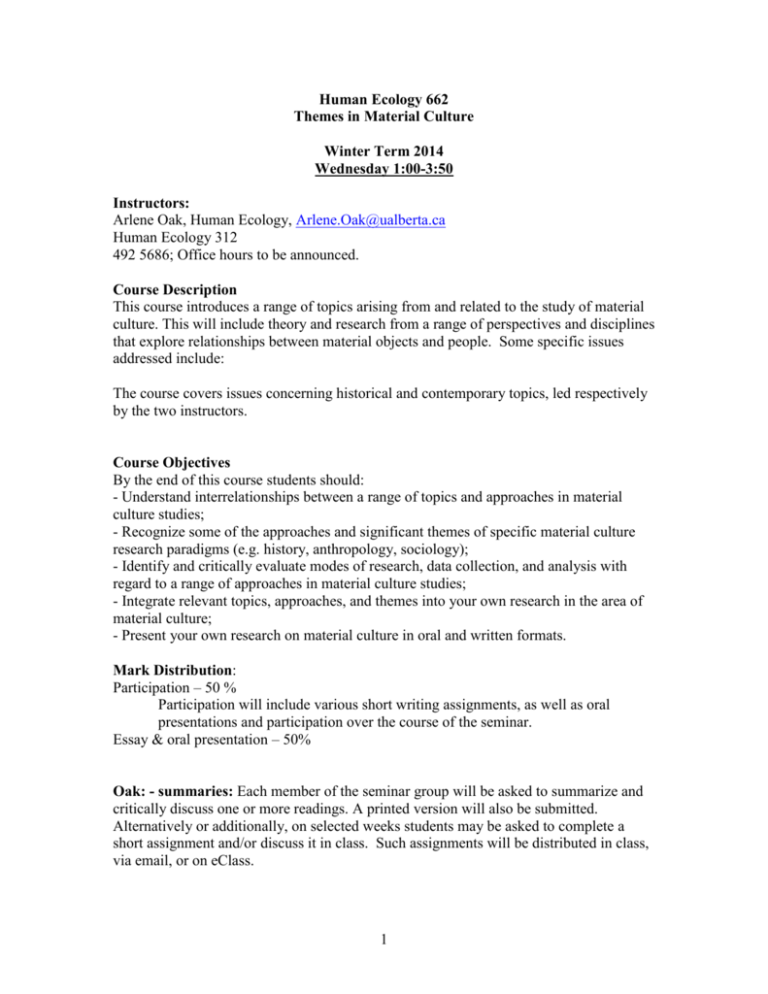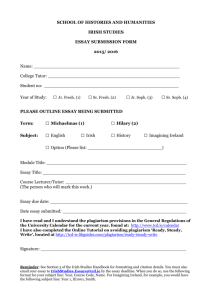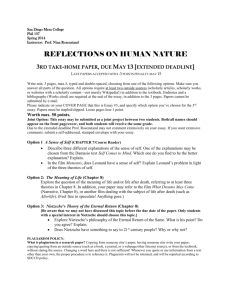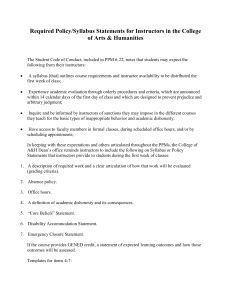Course Schedule - University of Alberta
advertisement

Human Ecology 662 Themes in Material Culture Winter Term 2014 Wednesday 1:00-3:50 Instructors: Arlene Oak, Human Ecology, Arlene.Oak@ualberta.ca Human Ecology 312 492 5686; Office hours to be announced. Course Description This course introduces a range of topics arising from and related to the study of material culture. This will include theory and research from a range of perspectives and disciplines that explore relationships between material objects and people. Some specific issues addressed include: The course covers issues concerning historical and contemporary topics, led respectively by the two instructors. Course Objectives By the end of this course students should: - Understand interrelationships between a range of topics and approaches in material culture studies; - Recognize some of the approaches and significant themes of specific material culture research paradigms (e.g. history, anthropology, sociology); - Identify and critically evaluate modes of research, data collection, and analysis with regard to a range of approaches in material culture studies; - Integrate relevant topics, approaches, and themes into your own research in the area of material culture; - Present your own research on material culture in oral and written formats. Mark Distribution: Participation – 50 % Participation will include various short writing assignments, as well as oral presentations and participation over the course of the seminar. Essay & oral presentation – 50% Oak: - summaries: Each member of the seminar group will be asked to summarize and critically discuss one or more readings. A printed version will also be submitted. Alternatively or additionally, on selected weeks students may be asked to complete a short assignment and/or discuss it in class. Such assignments will be distributed in class, via email, or on eClass. 1 Essay & presentation: Each member of the seminar will select a topic in consultation with an instructor and ensure that the topic contains a substantial material element. This topic will be assessed in conjunction with study of the requisite material and a final essay prepared. Further instructions will be forthcoming. Recording is permitted only with the prior written consent of the professor or if recording is part of an approved accommodation plan. ---------------------------------------------------------------------------------------------------------- Course Schedule: Week 1 – 8 January 2014 Introduction to Material Culture Studies: Presenting & interpreting Material Culture: Manufactured Landscapes --------------------------------------------Week 2 – 15 January 2014 Issues: Objects & Language Kingerly, David (ed.) (1996) Learning from Things: Method and Theory in Material Culture Studies, Chapter 1: David Kingerly, Introduction; Chapter 2: Jules Prown, Materia/Culture: Can the Farmer and the Cowman Still be Friends? Miller, Daniel (1987) Material Culture and Mass Consumption, Chapter 7: Artefacts in their contexts, 110-130. Woolgar, Steve (2002) After Word: On Some Dynamics of Duality Interrogation, Or, Why Bonfires are not Enough, Theory Culture and Society, Vol 19, 5/6, 261-270 (esp. 261-265). -----------------------------------------------------Week 3 – 22 January 2011 Approaching objects 1: History & cultural studies Hebdige, Dick (1988), Hiding in the Light, Chapter 4: Object as Image: The Italian Scooter Cycle, 77-115. Laurel Ulrich, “Of Pens and Needles: Sources in Early American Women’s History” The Journal of American History 77:1 (1990) pp. 200-207. Ann Smart Martin, “Makers, Buyers and Users: Consumerism as a Material Culture Framework” Winterthur Portfolio 28:2/3 (1993), 141-57. 2 Giorgio Riello, “Things that Shape History: Material Culture and Historical Narrative” in Karen Harvey, ed., History and Material Culture: A Student’s Guide to Approaching Alternative Sources (London: Routledge, 2009), chapter 1. * Richard Grassby, “Material Culture and Cultural History” Journal of Interdisciplinary History 35:4 (2005). * Karen Harvey, “Barbarity in a Teacup? Punch, Domesticity and Gender in the Eighteenth Century” Journal of Design History 21:3 (2008), pp. 205-221. Dant, Tim (1999) Material Culture in the Social World, Open University Press, Introduction: The Cairn and the Mini-Strip, pp. 1-16 --------------------------------------------------------Week 4 – 29 January 2014 Approaching objects 2: Psychology, sociology, anthropology Dant, Tim (2004) The Driver-car, Theory, Culture & Society, 21(4/5), 61-79. Norman, Donald (1998) The Design of Everyday Things, Chapter 1: The Psychopathology of Everyday Things, 1-33. Ucko, Peter (1969) Penis Sheaths: A Comparative Study, Proceedings of the Royal Anthropological Institute of Great Britain and Ireland, pp. 27-67. ------------------------------------------------------Week 5 – 5 February 2014 Production ---------------------------------------------------------Week 6 – 12 February 2014 Mediation ----------------------------------------------------------------------------------------------------------READING WEEK 17-22 February 2014 -----------------------------------------------------------------------------------------------------------Week 8 – 26 February 2014 3 Consumption -----------------------------------------------------------------------Week 9 – 5 March 2014 Organizing objects Baudrillard Barthes ----------------------------------------------------------------------Week 10 – 12 March 2014 Networking objects Latour, B. (1999) Circulating Reference: Sampling the soil in the Amazon Forest, in B. Latour, Pandora’s Hope: Essays on the reality of science studies, pp. 24-79. Russel, I. (2007) Objects and agency: Some obstacles and opportunities of Modernity, Journal of Iberian archaeology, 9/10, http://www.tara.tcd.ie/jspui/bitstream/2262/8698/1/objectsandagency.pdf Lynch, M. DeKanting Agency: Comments on Bruno Latour’s ‘On Interobjectivity’, Mind, Culture, and Activity, 3 (4), 246-251 Shiga, J. (2007) Translations: Artifacts from an Actor-Network perspective, Artifact, 1 (1), 40-55. Spyer, Patricia (ed.) (1998) Border Fetishisms, Chapter 7, Peter Stallybrass: Marx’s Coat, 183-207 --------------------------------------------------------------Week 11 – 19 March 2014 Material Culture, the Body Twigg, Julia (2004) The Body, Gender, and Age: Feminist insights in social gerontology, Journal of Aging Studies, 18, 59-73. Tyner, Keila and Jennifer Paff Ogle (2007), Feminist Perspectives on Dress and the Body: An Analysis of Ms. Magazine, 1972 to 2002, Clothing and Textiles Research Journal, 25, 74-105. 4 Grove-White, Annie (2001) No Rules, Only Choices? Repositioning the self within the fashion system in relation to expertise and meaning: A case study of colour and image consultancy, Journal of Material Culture, 6, 193-211. Joanne Entwistle (2002) The Aesthetic Economy: The production of value in the field of fashion modelling, Journal of Consumer Culture, 2/3, 317-339. -----------------------------------------------------------------------Week 12 – 26 March 2014 Material Culture & Performances Entwistle, Joanne and Agnes Rocamora (2006) The Field of Fashion Materialized: A study of London Fashion Week, Sociology, 40 (4), 735-751. Haldrup, Michael and Jonas Larsen (2006) Material Cultures of Tourism, Leisure Studies, 25 (3), 275-289. Parrot, Fiona (2005) ‘It’s Not Forever’: The Material Culture of Hope, Journal of Material Culture, 10, 245-262. ------------------------------------------------------------------------Week 13 – 2 April 2011 Student presentations -------------------------------------------------------------------------Week 14 – 9 April 2011 Student Presentations --------------------------------------------------------------------------Course Policies: Special Needs If you have personal and/or academic special needs (e.g. learning disabilities, physical disabilities, language-comprehension problems, etc.), please notify the instructors at the start of the course. Special arrangements for assignments can only be provided with documentation of special needs. Reading and preparation The schedule tells you what readings need to be completed for each class. You should be prepared to discuss assigned readings at each class. Computers and electronic devices Please do not use computers during class unless you have discussed their use with the instructors. Also, please ensure all electronic devices (phones, Blackberries, etc.) are turned off during class. 5 Attendance If you miss a class, you are still responsible for material covered and for being aware of any special announcements or assignments. Class attendance and participation are important. It is expected that you will attend regularly and participate in class discussions. Instructors do not need to be informed if you miss a class. Contacting instructors: Generally email is best. Please include in your email’s subject heading this course number (HECOL 666) and please USE YOUR UofA EMAIL ADDRESS!!! If your email message is urgent, please indicate this in the subject heading. Essay Lateness due to illness If an assignment is late due to illness and consequent abscence, a doctor’s certificate or note is required within three days of your return. If there are other personal matters that prevent you from handing in an assignment on time you should inform the instructors as soon as possible by email. Grading guidelines: Descriptor Outstanding Excellent Superior Letter Grade Point Value A+ 4 98-100% A 4 94-97 A3.7 90-93 At A level there is superior performance that demonstrates complexity, depth, and clear achievement of all assignment requirements. Very good Good Commendable B+ B B- 3.3 3.0 2 85-89 80-84 75-79 At B level there is good knowledge of the subject matter with most requirements met. Satisfactory Competent Just adequate C+ C C- 2.3 2.0 1.7 70-74 65-69 60-64 At C level there is basic competency in reaching most requirements. Poor Minimal Pass D+ D 1.3 1.0 55-59 50-54 At D level there is marginal competency in reaching assignment requirements. Fail F 0 49& below Does not meet requirements. Benchmarks for GPA on the four-point scale: 3.5: Distinction 2.0: Satisfactory 1.7 – 1.9: Marginal Standing 1.6 and below: Required to withdraw (RTW) Student Services: There are many student services available to you, please see the following link for more information http://www.uofaweb.ualberta.ca/studentservices/ Ethical Issues: Intellectual Honesty/Plagiarism 6 In all academic work, you must acknowledge ideas, information and statements that are not your own--both to avoid the charge of plagiarism and to enable a reader to go to your sources if she/he wishes to read further. This includes any and all Internet material. The Centre 4 Writers and Academic Support Services offer one-on-one tutorials and a range of other resources that deal with how to avoid plagiarism. (They also cover other issues that are relevant to writing academic papers, dissertations - including conducting research effectively, time management, etc.) University policies concerning plagiarism are found in the General Faculties Council Policy Manual section 61.6 (University of Alberta Marking and Grading Guidelines) and in the University of Alberta Course Calendar in section 23.4 (Evaluation Procedures and Grading Systems). The GFC Policy Manual and the Calendar can be accessed through the UofA home page. Plagiarism, Cheating, Misrepresentation of Facts and Participation are Offences. These are viewed as serious academic offences by the University and by the Campus Law Review Committee (CLRC) of General Faculties Council. Sanctions for such offences range from a reprimand to suspension or expulsion from the University. Please familiarize yourselves with the Code of Student Behaviour at http://www.uofaweb.ualberta.ca/secretariat/ The Code is also available in hard copy from the University Secretariat, 2-5 University Hall, Telephone: 24965. All students are required to be familiar with the code. 30.3.2 Please especially note the following: 30.3.2(1) Plagiarism No Student shall submit the words, ideas, images or data of another person as the Student’s own in any academic writing, essay, thesis, project, assignment, presentation or poster in a course or program of study. 30.3.2(2) Cheating 30.3.2(2) No Student shall in the course of an examination or other similar activity, obtain or attempt to obtain information from another Student or other unauthorized source, give or attempt to give information to another Student, or use, attempt to use or possess for the purposes of use any unauthorized material. 30.3.2(2) No Student shall represent or attempt to represent him or herself as another or have or attempt to have himself or herself represented by another in the taking of an examination, preparation of a paper or other similar activity. See also misrepresentation in 30.3.6 (4). 30.3.2(2) No Student shall represent another’s substantial editorial or compositional assistance on an assignment as the Student’s own work. 30.3.2(2) No Student shall submit in any course or program of study, without the written approval of the course Instructor, all or a substantial portion of any academic writing, essay, thesis, research report, project, assignment, presentation or poster for which credit has previously been obtained by the Student or which has been or is being submitted by the Student in another course or program of study in the University or elsewhere. 30.3.2(2) No Student shall submit in any course or program of study any academic writing, essay, thesis, report, project, assignment, presentation or poster containing a statement of fact known by the Student to be false or a reference to a source the Student knows to contain fabricated claims (unless acknowledged by the Student), or a fabricated reference to a source. 7









